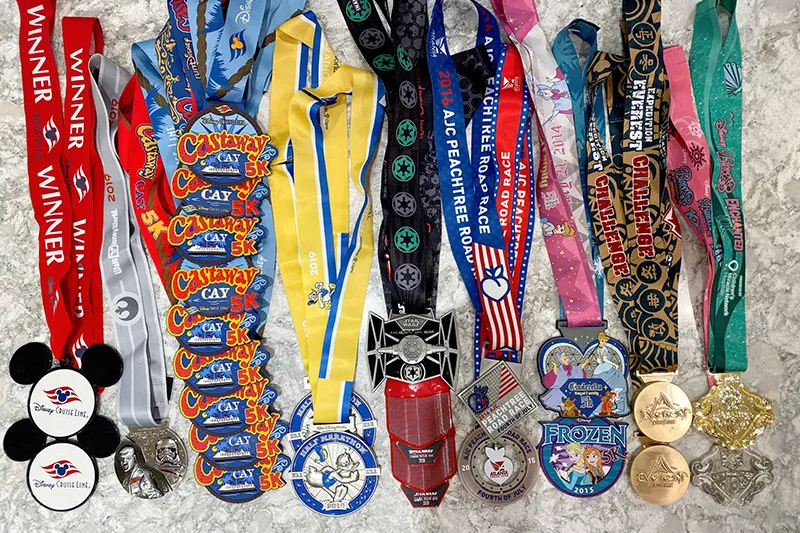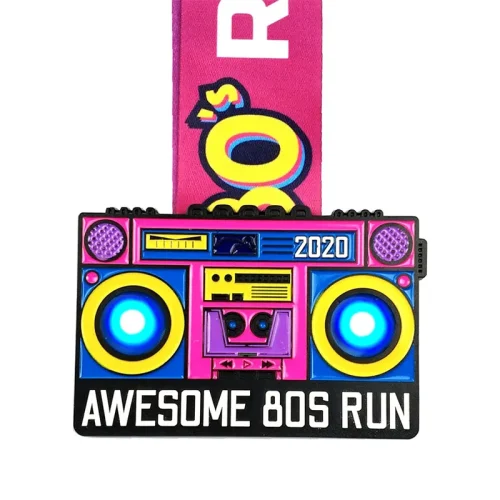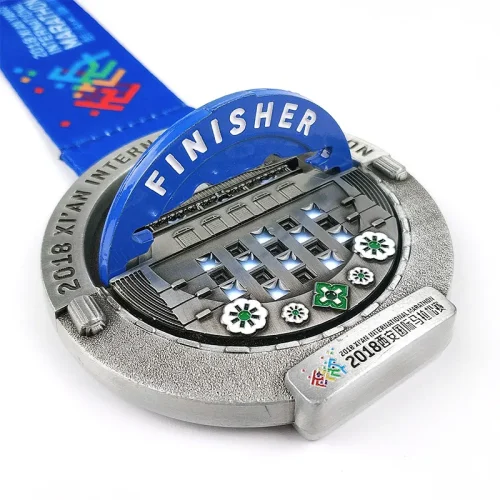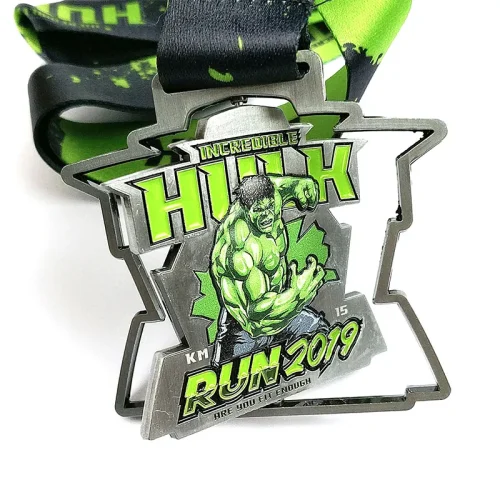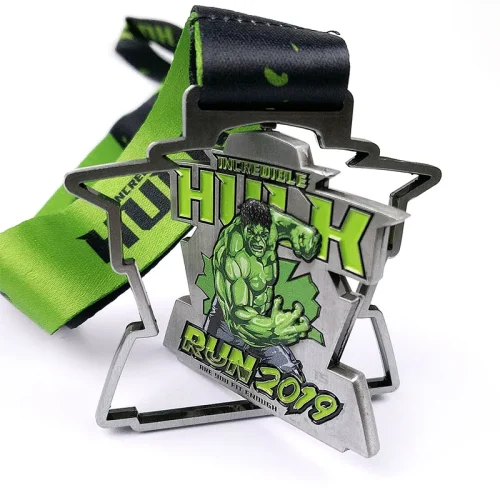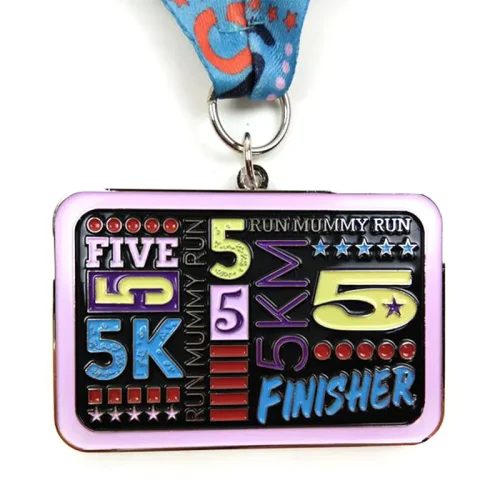Marathons are a testament to endurance, determination, and personal achievement. A significant part of this journey is the marathon medal, a symbol of the effort and commitment each runner has invested. Marathon medals come in various types, materials, and designs, each with its unique story.
In this article, we will delve into the different types of marathon medals based on competition, material, and color. We will also look at famous marathon medals, and how to design and produce custom race medals.
Types of Marathon Medals Based on Competition
Finisher Medals
Finisher medals are awarded to every runner who crosses the finish line, regardless of their finishing time. These medals celebrate the achievement of completing the marathon, acknowledging the physical and mental effort required. They often feature the event’s logo, date, and unique design elements that reflect the race’s theme or location.
Age Group Awards Medals
Age group awards recognize the fastest runners within specific age categories, such as 20-29, 30-39, and so on. These medals incentivize competition among peers and reward top performers in each age bracket. Typically, age group awards are given to the top three finishers in each category, often with distinct designs to signify first, second, and third places.
Charity Medals
Charity medals are given to participants who run for charitable causes. These medals often include symbols or logos representing the charity, adding sentimental value. Running for a cause provides extra motivation and purpose, making charity medals particularly meaningful for those who receive them.
Types of Marathon Medals Based on Material
Metal Medals
Metal medals are the most traditional and prestigious. Made from materials like zinc, brass, or stainless steel, these medals are durable and can be intricately designed. Their weight and finish give a sense of accomplishment and quality. Metal medals are ideal for major marathons and events seeking a classic, enduring symbol of achievement.
Plastic Medals
Plastic medals offer a cost-effective alternative to metal. They are lightweight and can be produced in various colors and designs. Although they may not have the same heft as metal medals, plastic medals are perfect for smaller races, youth events, and fun runs where affordability and creativity are key.
Rubber Medals
Rubber medals provide a unique and flexible option. They are soft, making them safe for children’s events and novelty races. Rubber medals can be molded into various shapes and designs, allowing for a playful and innovative approach to race awards.
Wooden Medals
Wooden medals are an eco-friendly choice, offering a rustic and natural aesthetic. They can be laser-engraved with intricate designs and personalized messages. Wooden medals are popular for environmentally conscious events and those looking to offer something distinctive and memorable.
Color Variations in Marathon Medals
The color of a marathon medal can signify different levels of achievement or participation. Common color schemes include:
Gold, Silver, and Bronze Medals
These classic colors represent first, second, and third places, respectively. They are universally recognized and respected symbols of achievement.
Antique Medals: Antique Silver, Antique Gold, Antique Bronze
Antique finish medals have a vintage look, offering a unique and distinguished appearance. These are often used for special editions or commemorative races.
Custom-Colored Medals
Custom-colored medals allow for creativity and personalization. Race organizers can choose colors that reflect the event’s branding or theme, making each medal unique to the race.
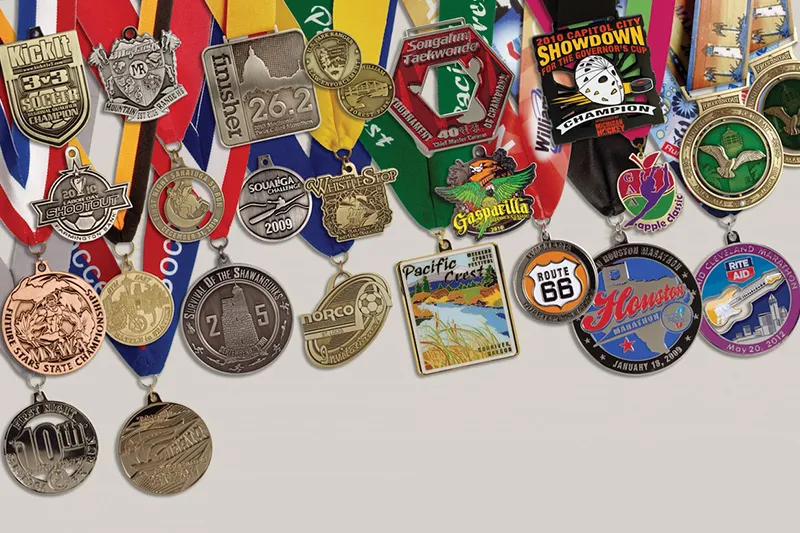
Examples of Famous Marathon Medals
Some marathon medals have gained fame due to their unique designs and the prestigious events they represent. The New York City Marathon medal, for example, features the iconic skyline of New York City, making it a sought-after prize for runners around the world. Similarly, the Boston Marathon medal, known for its unicorn emblem, symbolizes the rich history and tradition of one of the oldest marathons in the world. These famous medals not only represent personal achievement but also the legacy and prestige of the races themselves.
Several marathons are renowned for their iconic medals. Here are a few examples:
Boston Marathon Medals
The Boston Marathon medal is a coveted prize, featuring the iconic unicorn emblem and symbolizing one of the world’s oldest and most prestigious marathons.
New York City Marathon Medals
This medal is known for its intricate design and the representation of the city’s five boroughs, celebrating the diverse and vibrant spirit of New York.
London Marathon Medals
The London Marathon medal often features landmarks like the Tower Bridge, making it a treasured keepsake for participants of this historic race.
Berlin Marathon Medals
Known for its sleek and modern design, the Berlin Marathon medal reflects the race’s status as one of the world’s fastest marathons.
Designing Custom Race Medals
Creating custom race medals involves several important steps. First, define the purpose and theme of the medal. This helps in choosing the right shape, size, and material. Next, incorporate unique elements like the event’s logo, date, and specific motifs that reflect the race’s character. Work with professional designers to bring these ideas to life, ensuring the medal is both visually appealing and meaningful. Custom medals should resonate with participants, offering a tangible memory of their accomplishment.
Creating a custom race medal involves several key steps to ensure it meets the event’s standards and participants’ expectations.
Conceptualization and Design
Start with a clear concept that reflects the race’s theme or purpose. Work with a designer to create a detailed sketch or digital mock-up of the medal.
Material Selection
Choose the appropriate material based on your budget and the level of the event. Consider factors like durability, weight, and finish.
Incorporating Branding Elements
Ensure the medal design includes the race logo, date, and any other relevant branding elements. This adds a professional touch and makes the medal more memorable.
Producing Custom Award Medals
Producing custom medals requires collaboration with a reputable manufacturer. Start by discussing your design ideas and specifications with the manufacturer. They can provide insights into the feasibility and cost of different designs and materials. It’s essential to request samples before finalizing the order to ensure the quality meets your expectations.
Selecting a Manufacturer
Choose a manufacturer with experience in producing high-quality medals. Look for reviews and testimonials from previous clients to gauge their reliability. Consider factors such as production time, cost, and the ability to handle large orders. A good manufacturer will guide you through the process, from initial design to final production, ensuring your custom medals are delivered on time and within budget.
Prototyping
Create a prototype of the medal to review the design and make any necessary adjustments. This step helps in visualizing the final product and ensuring it meets quality standards.
Mass Production
After approval of the prototype, proceed with mass production. Choose a reliable manufacturer experienced in producing medals to ensure consistency and quality.
Quality Control
Quality control is vital in the production process. Inspect the samples thoroughly and communicate any necessary adjustments to the manufacturer. Ensure the final product matches the approved sample in terms of design, material, and finish. Proper quality control guarantees that the medals you receive will meet the standards expected by participants.
Promoting Your Marathon with Unique Medals
Unique and well-designed medals can significantly enhance the appeal of your marathon. Here’s how to leverage medals for promotion:
Social Media Campaigns
Use social media to showcase the medal design, creating excitement and anticipation among potential participants. Share behind-the-scenes looks at the design and production process.
Participant Testimonials
Encourage past participants to share their experiences and photos with their medals. Highlighting these testimonials can attract more runners to future events.
Sponsorship Opportunities
Offer medal sponsorship opportunities to local businesses. This can help offset costs and provide additional marketing benefits for both the event and the sponsors.
Conclusion
Marathon medals are more than just awards; they are symbols of hard work, dedication, and personal achievement. Whether you’re organizing a marathon or participating in one, understanding the different types of medals and their significance can enhance the experience.
From traditional metal medals to innovative rubber and eco-friendly wooden options, each type offers unique benefits and opportunities for creativity. Designing and producing custom race medals involves thoughtful planning and collaboration, resulting in a meaningful and memorable keepsake for every runner.
By appreciating the diverse world of marathon medals, we celebrate the spirit of running and the incredible accomplishments of all who participate.

